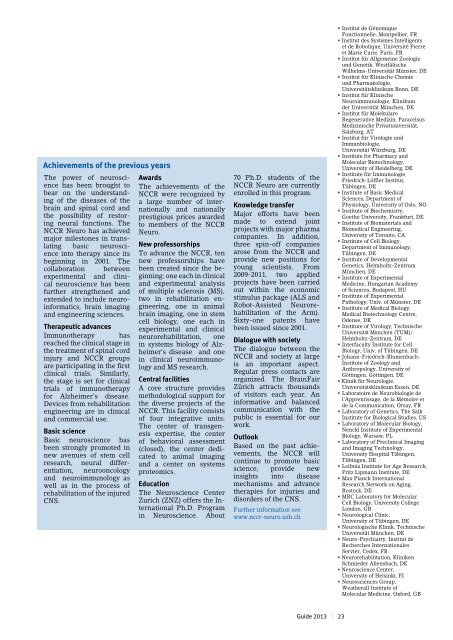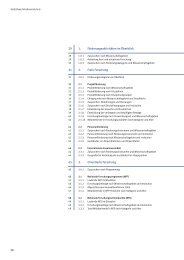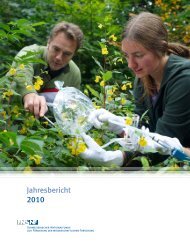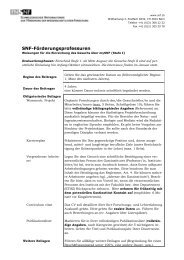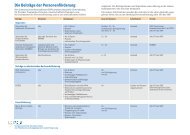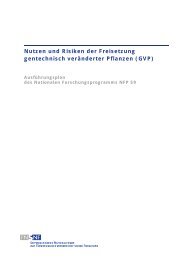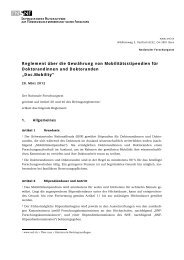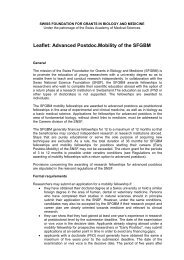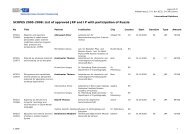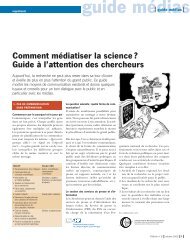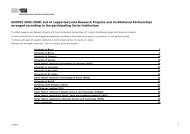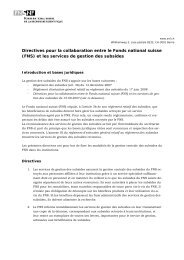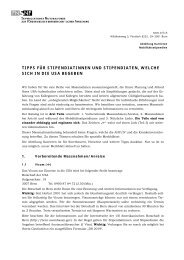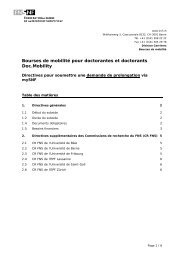NCCR Guide 2013 - Schweizerischer Nationalfonds (SNF)
NCCR Guide 2013 - Schweizerischer Nationalfonds (SNF)
NCCR Guide 2013 - Schweizerischer Nationalfonds (SNF)
You also want an ePaper? Increase the reach of your titles
YUMPU automatically turns print PDFs into web optimized ePapers that Google loves.
Achievements of the previous years<br />
The power of neuroscience<br />
has been brought to<br />
bear on the understanding<br />
of the diseases of the<br />
brain and spinal cord and<br />
the possibility of restoring<br />
neural functions. The<br />
<strong>NCCR</strong> Neuro has achieved<br />
major milestones in translating<br />
basic neuroscience<br />
into therapy since its<br />
beginning in 2001. The<br />
colla boration between<br />
experimental and clinical<br />
neuroscience has been<br />
further strengthened and<br />
extended to include neuroinforma<br />
tics, brain imaging<br />
and engineering sciences.<br />
Therapeutic advances<br />
Immunotherapy has<br />
reach ed the clinical stage in<br />
the treatment of spinal cord<br />
injury and <strong>NCCR</strong> groups<br />
are participating in the first<br />
clinical trials. Similarly,<br />
the stage is set for clinical<br />
trials of immunotherapy<br />
for Alzheimer‘s disease.<br />
Devices from rehabilitation<br />
engineering are in clinical<br />
and commercial use.<br />
Basic science<br />
Basic neuroscience has<br />
been strongly promoted in<br />
new avenues of stem cell<br />
research, neural differentiation,<br />
neurooncology<br />
and neuroimmunology as<br />
well as in the process of<br />
rehabilitation of the injured<br />
CNS.<br />
Awards<br />
The achievements of the<br />
<strong>NCCR</strong> were recognized by<br />
a large number of internationally<br />
and nationally<br />
prestigious prices awarded<br />
to members of the <strong>NCCR</strong><br />
Neuro.<br />
New professorships<br />
To advance the <strong>NCCR</strong>, ten<br />
new professorships have<br />
been created since the beginning:<br />
one each in clinical<br />
and experimental analysis<br />
of multiple sclerosis (MS),<br />
two in rehabilitation engineering,<br />
one in animal<br />
brain imaging, one in stem<br />
cell biology, one each in<br />
experimental and clinical<br />
neurorehabilitation, one<br />
in systems biology of Alzheimer‘s<br />
disease and one<br />
in clinical neuroimmunology<br />
and MS research.<br />
Central facilities<br />
A core structure provides<br />
methodological support for<br />
the diverse projects of the<br />
<strong>NCCR</strong>. This facility consists<br />
of four integrative units:<br />
The center of transgenesis<br />
expertise, the center<br />
of behavioral assessment<br />
(closed), the center dedicated<br />
to animal imaging<br />
and a center on systems<br />
proteomics.<br />
Education<br />
The Neuroscience Center<br />
Zurich (ZNZ) offers the International<br />
Ph.D. Program<br />
in Neuroscience. About<br />
70 Ph.D. students of the<br />
<strong>NCCR</strong> Neuro are currently<br />
enrolled in this program.<br />
Knowledge transfer<br />
Major efforts have been<br />
made to extend joint<br />
projects with major pharma<br />
companies. In addition,<br />
three spin-off companies<br />
arose from the <strong>NCCR</strong> and<br />
provide new positions for<br />
young scientists. From<br />
2009-2011, two applied<br />
projects have been carried<br />
out within the economic<br />
stimulus package (ALS and<br />
Robot-Assisted Neurorehabilitation<br />
of the Arm).<br />
Sixty-one patents have<br />
been issued since 2001.<br />
Dialogue with society<br />
The dialogue between the<br />
<strong>NCCR</strong> and society at large<br />
is an important aspect.<br />
Regular press contacts are<br />
organized. The BrainFair<br />
Zürich attracts thousands<br />
of visitors each year. An<br />
informative and balanced<br />
communication with the<br />
public is essential for our<br />
work.<br />
Outlook<br />
Based on the past achievements,<br />
the <strong>NCCR</strong> will<br />
continue to promote basic<br />
science, provide new<br />
insights into disease<br />
mechanisms and advance<br />
therapies for injuries and<br />
disorders of the CNS.<br />
Further information see<br />
www.nccr-neuro.uzh.ch<br />
• Institut de Génomique<br />
Fonctionnelle, Montpellier, FR<br />
• Institut des Systèmes Intelligents<br />
et de Robotique, Université Pierre<br />
et Marie Curie, Paris, FR<br />
• Institut für Allgemeine Zoologie<br />
und Genetik, Westfälische<br />
Wilhelms-Universität Münster, DE<br />
• Institut für Klinische Chemie<br />
und Pharmakologie,<br />
Universitätsklinikum Bonn, DE<br />
• Institut für Klinische<br />
Neuroimmunologie, Klinikum<br />
der Universität München, DE<br />
• Institut für Molekulare<br />
Regenerative Medizin, Paracelsus<br />
Medizinische Privatuniversität,<br />
Salzburg, AT<br />
• Institut für Virologie und<br />
Immunbiologie,<br />
Universität Würzburg, DE<br />
• Institute for Pharmacy and<br />
Molecular Biotechnology,<br />
University of Heidelberg, DE<br />
• Institute für Immunologie,<br />
Friedrich-Löffler Institut,<br />
Tübingen, DE<br />
• Institute of Basic Medical<br />
Sciences, Department of<br />
Physiology, University of Oslo, NO<br />
• Institute of Biochemistry,<br />
Goethe University, Frankfurt, DE<br />
• Institute of Biomaterials and<br />
Biomedical Engineering,<br />
University of Toronto, CA<br />
• Institute of Cell Biology,<br />
Department of Immunology,<br />
Tübingen, DE<br />
• Institute of Developmental<br />
Genetics, Helmholtz-Zentrum<br />
München, DE<br />
• Institute of Experimental<br />
Medicine, Hungarian Academy<br />
of Sciences, Budapest, HU<br />
• Institute of Experimental<br />
Pathology, Univ. of Münster, DE<br />
• Institute of Medical Biology,<br />
Medical Biotechnology Centre,<br />
Odense, DK<br />
• Institute of Virology, Technische<br />
Universität München (TUM)/<br />
Helmholtz-Zentrum, DE<br />
• Interfaculty Institute for Cell<br />
Biology, Univ. of Tübingen, DE<br />
• Johann-Friedrich-Blumenbach-<br />
Institute of Zoology and<br />
Anthropology, University of<br />
Göttingen, Göttingen, DE<br />
• Klinik für Neurologie,<br />
Universitätsklinikum Essen, DE<br />
• Laboratoire de Neurobiologie de<br />
l’Apprentissage, de la Mémoire et<br />
de la Communication, Orsay, FR<br />
• Laboratory of Genetics, The Salk<br />
Institute for Biological Studies, US<br />
• Laboratory of Molecular Biology,<br />
Nencki Institute of Experimental<br />
Biology, Warsaw, PL<br />
• Laboratory of Preclinical Imaging<br />
and Imaging Technology,<br />
University Hospital Tübingen,<br />
Tübingen, DE<br />
• Leibniz Institute for Age Research,<br />
Fritz Lipmann Institute, DE<br />
• Max Planck International<br />
Research Network on Aging,<br />
Rostock, DE<br />
• MRC Laboratory for Molecular<br />
Cell Biology, University College<br />
London, GB<br />
• Neurological Clinic,<br />
University of Tübingen, DE<br />
• Neurologische Klinik, Technische<br />
Universität München, DE<br />
• Neuro-Psychiatry, Institut de<br />
Recherches Internationales<br />
Servier, Cedex, FR<br />
• Neurorehabilitation, Kliniken<br />
Schmieder Allensbach, DE<br />
• Neuroscience Center,<br />
University of Helsinki, FI<br />
• Neurosciences Group,<br />
Weatherall Institute of<br />
Molecular Medicine, Oxford, GB<br />
<strong>Guide</strong> <strong>2013</strong> | 23


